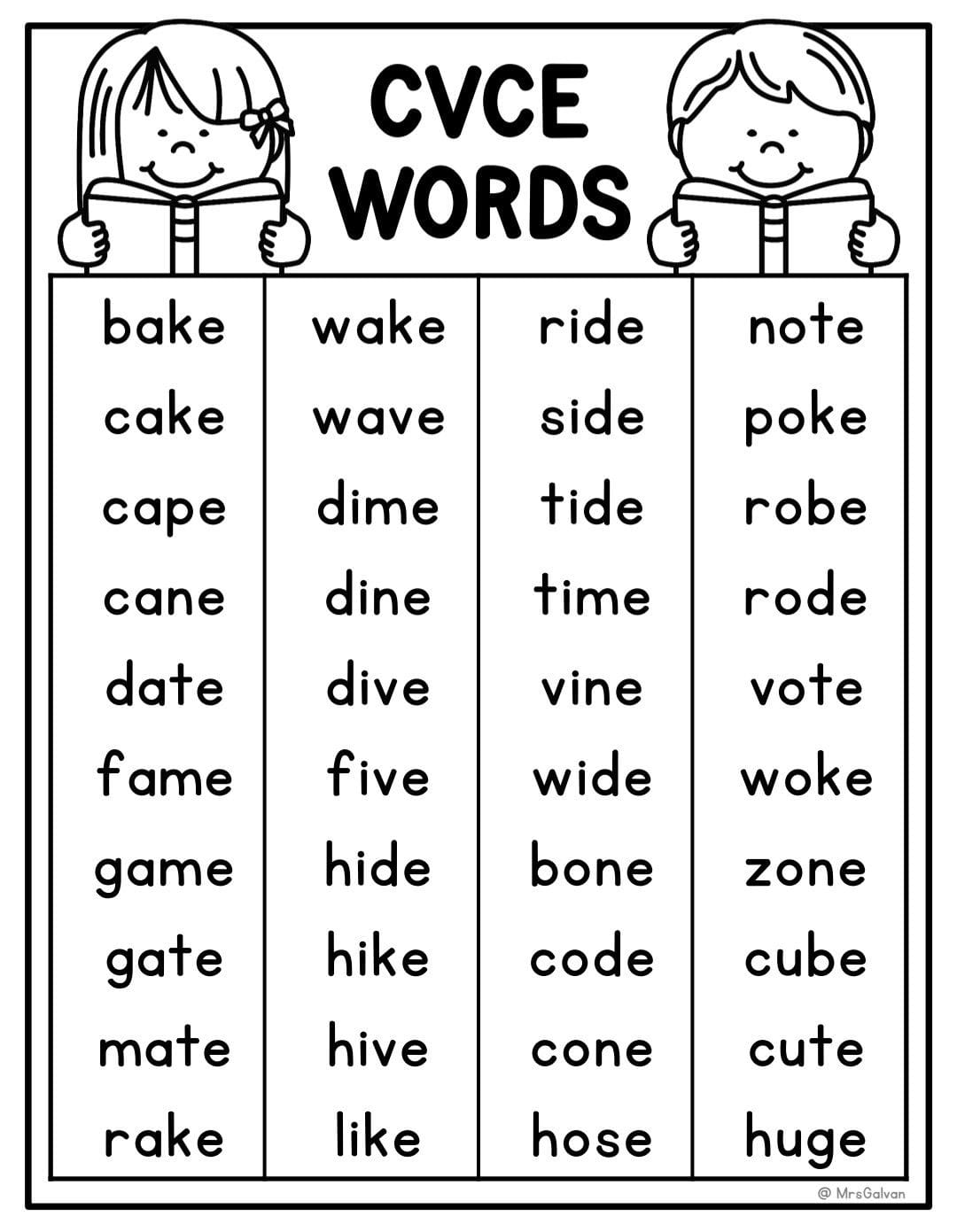This guide provides parents and educators with the tools and strategies to help children confidently navigate the world of CVCe words, enriching their reading journey.
Decoding CVCe Words: A Simple Explanation
CVCe words, also known as “magic e” or “silent e” words, follow a consonant-vowel-consonant-silent e pattern. This seemingly simple structure holds a key to unlocking reading fluency. The silent “e” modifies the preceding vowel sound, transforming it from a short sound to its long counterpart. For example, adding a silent “e” to “cap” creates “cape,” shifting the “a” from a short to a long vowel sound.
Why CVCe Words Matter in Early Literacy
CVCe words are foundational elements of reading. A strong grasp of these words can significantly impact a child’s reading development in several ways:
- Improved Fluency: Recognizing CVCe words allows for smoother, more automatic decoding, leading to enhanced reading fluency and comprehension. This consistent decoding practice builds confidence and reduces frustration during reading.
- Enhanced Spelling Accuracy: Understanding the silent “e” pattern equips children with a valuable tool for spelling. It clarifies the relationship between sounds and spelling patterns, improving their overall spelling accuracy.
- Vocabulary Expansion: CVCe words represent a significant portion of the English language. Mastery of this pattern unlocks access to a wealth of new vocabulary, enriching comprehension and communication skills.
Engaging Activities for Mastering CVCe Words
Learning CVCe words can be enjoyable and effective with multi-sensory, interactive activities:
1. Hands-on Learning:
- Magnetic Letters: Manipulating magnetic letters on a board allows children to physically build CVCe words, adding the “e” to observe the vowel sound transformation.
- Word Sorting: Sorting CVCe and non-CVCe word cards reinforces pattern recognition and strengthens understanding.
- Word Families: Exploring word families (e.g., cape, tape, rape, grape) helps children grasp the consistent impact of the silent “e” across different words.
2. Utilizing Printable Resources:
Worksheets, word lists, and flashcards provide structured practice and reinforcement. Numerous free resources are available online, easily searchable with terms like “CVCe worksheets” or “CVCe flashcards.”
3. Interactive Games:
- CVCe Bingo: This classic game makes learning fun and competitive, motivating children to identify and match CVCe words.
- Matching Games: Matching CVCe word cards with corresponding pictures enhances vocabulary and reinforces word recognition.
- Online Phonics Games: Digital games offer engaging practice and can provide immediate feedback, promoting independent learning.
4. Educational Videos:
Videos with catchy songs and animations present CVCe concepts in a clear and entertaining manner, making learning more accessible and enjoyable.
Understanding Long Vowel Sounds in CVCe Words:
| Vowel | Short Sound Example | Long Sound CVCe Example |
|---|---|---|
| A | cat | cake |
| E | pet | Pete |
| I | pin | pine |
| O | hop | hope |
| U | cut | cute |
Exploring Advanced CVCe Concepts:
- Exceptions to the Rule: The silent “e” doesn’t always signify a long vowel sound (e.g., “love”). Addressing these exceptions helps children develop a nuanced understanding.
- Consonant Blends: Introducing CVCe words with consonant blends (e.g., “blame”) progressively challenges children’s decoding skills.
- Word Formation and Morphology: Older or more advanced learners can explore how CVCe words form the basis for more complex words by adding suffixes like “-ing” or “-ed.” This introduces them to the concept of morphology, the study of word formation.
Key Points of CVCe Words:
- Definition: Words with a consonant-vowel-consonant-silent “e” pattern.
- Effect of Silent “e”: Changes the vowel sound to its long version, making the word easier to decode.
- Importance:
- Smoother reading and improved fluency.
- Enhanced spelling skills.
- Expanded vocabulary by unlocking new words.
- Teaching Methods:
- Multi-sensory activities: Magnetic letters, word sorting, word families.
- Printable resources: Worksheets, word lists, flashcards.
- Games: Bingo, matching games, online phonics games.
- Educational videos: Animated explanations and catchy songs.
- Long Vowel Sounds in CVCe Words:
- A: cat (short) -> cake (long)
- E: pet (short) -> Pete (long)
- I: pin (short) -> pine (long)
- O: hop (short) -> hope (long)
- U: cut (short) -> cute (long)
- Advanced Concepts:
- Exceptions: “e” does not always indicate a long vowel sound (e.g., “love”).
- Consonant blends: CVCe words can also have consonant blends (e.g., “blame”).
- Word formation: Exploring how CVCe words relate to morphology (e.g., adding suffixes like “-ing”).
Learning CVCe words is a gradual process. Patience and encouragement are crucial. By incorporating these tips and making learning fun, you can empower children to become confident and successful readers.
If you’re looking for expert guidance on any CVS Learnet topic, don’t hesitate to explore our comprehensive CVS Learnet Answers section.
Unlocking 7-Letter Words: Strategies for Word Game Mastery
Seven-letter words hold a special place in word games like Scrabble and Wordle. Mastering them can significantly boost your gameplay and expand your vocabulary. Approximately 34,367 seven-letter words exist in word game dictionaries, offering a vast landscape for exploration.
Finding 7-Letter Words
Several tools can help you navigate this vast word collection:
- Word Finder Tools: Online word finders allow you to input available letters, including blanks or wildcards, and generate all possible seven-letter words.
- Unscramble Tools: Decipher jumbled letters to uncover hidden seven-letter words.
- Pattern Matching: Recognizing common letter combinations can help you identify potential seven-letter words.
Strategic Approaches for Word Games
- High-Probability Words: Focusing on frequently used seven-letter words, like “NATURES” or “RETAINS,” increases your chances of success in word games.
- Wordle Starting Words: Strategic opening words in Wordle, such as “SCHOLIA” or “HEGIRAS,” rich in vowels, can greatly narrow down possibilities. While not foolproof, this approach often provides valuable clues early on.
Examples of 7-Letter Words
Here are a few examples to add to your repertoire:
- NEROLIS: An oil used in perfumery.
- TRISULA: A trident, symbolic of the Hindu god Shiva.
- TAILORS, RITUALS, RETAINS, OILNUTS, NEUTRAL, NATURES, SALUTER
Resources for 7-Letter Words
- Collins Dictionary: A reliable source for word definitions and spellings.
- Various Word Unscrambler Websites: Numerous websites specialize in unscrambling letters to form words.
- Word Find Websites: These websites help you discover words based on specific criteria.
Dominate Scrabble and Wordle with 34,000+ seven-letter words at your fingertips. From NEROLIS to TRISULA: Explore a diverse world of seven-letter words for every occasion. Unlock bonus points and expand your lexicon with high-probability seven-letter words. Master 7-letter word games with strategic starting words like SCHOLIA and HEGIRAS.
Decoding Anagrams: A Comprehensive Guide to Wordplay
Anagrams involve rearranging the letters of a word or phrase to create a new one. This wordplay can range from simple swaps (“listen” to “silent”) to more complex transformations (“dormitory” to “dirty room”).
Types of Anagrams
- Single Word Anagrams: Transforming one word into another (“state” to “taste”).
- Multi-Word Anagrams: Rearranging a phrase into new words or phrases (“a gentleman” to “elegant man”).
- Synanagrams (Rare): Anagrams that share the same meaning (requires further research).
- Antigrams (Rare): Anagrams with opposite meanings (requires further research).
Finding Anagrams
- Manual Rearrangement: Experimenting with letter combinations, perhaps writing them down and physically rearranging them.
- Online Anagram Solvers: Tools like WordFinder, UnscrambleX, and The Word Finder can quickly generate possible anagrams.
Using Anagrams
Anagrams enhance word games like Scrabble and Words With Friends, provide engaging puzzles, and add a creative flair to writing. Some experts believe anagrams may also play a role in improving cognitive function, though further research is needed.
| Original Word | Anagram |
|---|---|
| listen | silent |
| cinema | iceman |
| astronomer | moon starer |
| a gentleman | elegant man |
| state | taste |
Anagrams: Transforming Words into New Creations. Decode the Secrets of Anagrams: A Complete Guide to Word Rearrangement. Anagram Mastery: Elevate Your Word Game with these Tips and Tricks. Beyond Scrabble: Exploring the Fascinating World of Anagrams.
Elevating Your Lexicon: 9-Letter Words for Impeccable Communication
Nine-letter words offer a balance of sophistication and pronounceability, enhancing both written and spoken communication. While the earlier sections focused on CVCe words for early learners, this section explores impactful nine-letter words for advanced vocabulary development.
What Makes a “Great” Vocabulary Word?
“Great” vocabulary words are impactful, versatile, and contribute nuance to communication. These words go beyond basic descriptions and add depth to your expression.
Examples of 9-Letter Words
| Word | Part of Speech | Definition | Example Sentence |
|---|---|---|---|
| Belligerent | Adjective | Hostile and aggressive | His belligerent attitude made negotiation difficult. |
| Extraneous | Adjective | Irrelevant or unnecessary | Please remove all extraneous details from the report. |
| Flattering | Adjective | Full of praise or compliments | She received many flattering reviews for her performance. |
| Knowledge | Noun | Facts, information, and skills | A thirst for knowledge is essential for lifelong learning. |
| Transform | Verb | To change completely in form or appearance | Education can transform a person’s life. |
This is just a starting point. The English language is rich with powerful nine-letter words waiting to be discovered.
Practical Application
Actively using these words in your writing and conversations is key. Initially, it might feel unusual, but with practice, it will become natural. Keeping a vocabulary journal and regularly reviewing new words can aid in retention.
Unleash the power of language: Explore a curated selection of impactful 9-letter words to enhance your writing and communication. Beyond the mundane: Discover sophisticated 9-letter vocabulary words that will elevate your expression and leave a lasting impression. Expand your lexical repertoire: Master a diverse range of 9-letter words and unlock new levels of eloquence and precision in your language. From articulate to extraordinary: Transform your vocabulary with powerful 9-letter words that add depth and nuance to your communication.
- Georgia Platform: A Southern Strategy, 1850s - March 31, 2025
- How many weeks is 40 days: Quick Conversion Guide for Accurate Results - March 31, 2025
- How many feet is 300 meters? 984 Feet: Understand Length Conversions Easily - March 31, 2025

















1 thought on “Mastering CVCe Words: A Comprehensive Guide for Parents and Educators”
Comments are closed.